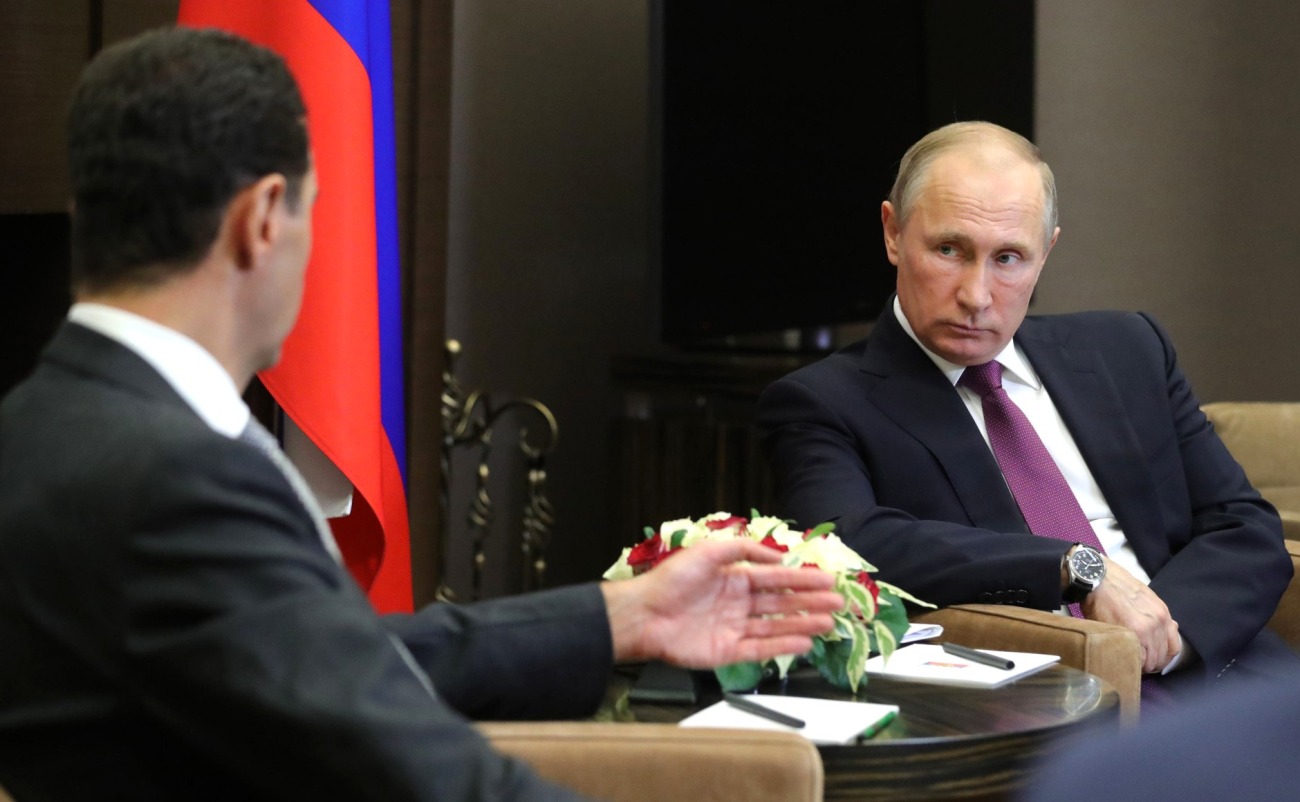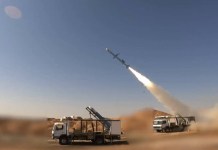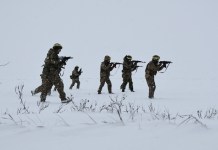There seems to be a global consensus among the strategic elites that the overthrow of the Assad regime is a huge jolt to Iran and Russia, whose military support, along with that of Hezbollah of neighboring Lebanon, the Syrian strongman was critically dependent upon ever since the outbreak of the civil war in 2011 in the country.
The “pain” to Moscow maybe even more, considering the fact that apart from the military backing to Bashar al-Assad, it was also providing him diplomatic support in the region.
In fact, thanks to Russia, the Arab League readmitted Syria last year after a more than decade-long suspension following a brutal government crackdown in 2011 on anti-Assad protesters.
Now that Assad has gone, has Russia lost its clout in Damascus? At first glance, this appears to be the case. But on closer scrutiny, President Putin seems to have left some ground for managing Russia’s core interests in Syria with the alliance led by the rebel group Hayat Tahrir al-Sham(HTS) chief Mohammad al-Jolani.
It may be noted that it was Russia’s military intervention in Syria in 2015 that changed the tide of the civil war. Moscow’s devastating aerial campaigns with Sukhoi fighter jets annihilated rebels-held cities and, by so doing, tipped the scales in Assad’s favor.
The factors behind Russian intervention in Syria then are equally relevant today. Moscow was said to have capitalized on its involvement “to sell itself as a power capable of challenging the United States, NATO, and the West in general while expanding its global reach from the Mediterranean to Africa and Latin America.” It proved that it had the capacity and will to come to the allies’ aid and keep them safe from the enemies.
In other words, it demonstrated Russian power in the region. The Russian calculation proved to be successful. Putin was able to maintain a healthy relationship with the Sunni monarchies, particularly in Saudi Arabia, the United Arab Emirates, and Qatar.
In fact, Russia, traditionally an influential power in parts of the Middle East and North Africa, made a geostrategic comeback in the region after the disintegration of the Soviet Union, thanks to its demonstration of power in Syria. Russian trade, FDI, arms exports, and military deployments have now gained currency in the region.
So much so that in 2016, OPEC signed a declaration of cooperation with ten additional countries and, most importantly, Russia. Though this agreement was seen as a temporary measure, to this day, there are no documents committing any non-OPEC members to long-term cooperation.
Though production management has also been done mostly on a six-month basis, in practice, in the eight years since signing the agreement, the group has worked with little distinction between the OPEC and non-OPEC members. Effectively, Saudi Arabia and Russia hold veto power in the discussions.
In the process, Russia did prompt many Middle Eastern regimes to pursue increasing normalization with Syria, even though many of them did detest Assad and his links with Iran.
Secondly, in return for Russian military support and diplomatic backing, Assad gave Russia a much-coveted warm-water port on the Mediterranean in Tartus and an air base near Latakia.
Incidentally, both were established during the Soviet era, when Syria was the Kremlin’s ally. Assad agreed to fresh “Agreements” on these bases for Russian operations with a 50-year validity. These agreements were of huge strategic significance for Russia.
Tartus, as the base, allowed Russia to conduct sustained surface and submarine operations in the Mediterranean Sea and served as a conduit for operations into the Indian Ocean. Its importance is all the more greater when the Russian Black Sea fleet is now under relentless drone attacks by Ukraine. Besides, the Tartous facility is Russia’s only Mediterranean repair and replenishment hub.
If Con Coughlin, author of the book Assad: The Triumph of Tyranny, is to be believed, Putin’s primary motivation for intervening in Syria in 2015 was to safeguard the two military bases mentioned above. Otherwise, Putin never liked Assad and “dismissed him as an incompetent fool;” his advisors persuaded him to intervene and save Assad “to safeguard” the two military bases.
It is quite possible that Putin’s doubts about Assad’s capability if there were any, might have increased when Assad refused to reconcile with Turkey’s President Tayyip Erdogan and explore political solutions to end the civil war.
Erdogan has been keen on resettling in northern Syria the estimated 3.5 million Syrian refugees who poured into his country since the start of the civil war because he wanted to further undermine Kurdish efforts in the region. Failure in talks with Assad made Erdogan support the rebels, particularly the HTS.
Besides, Putin was said to be increasingly getting frustrated over Assad’s unwillingness to find some measure of accommodation with the opposition. Therefore, at an international conference in Doha on December 7, Russian Foreign Minister Sergei Lavrov did or said little to stave off Assad’s collapse and appeared to wash his hands of the regime. On December 6, Russia recalled its troops and diplomats and began to withdraw from its bases.

In fact, there are reports of Russian officials telling Bloomberg News that Moscow had no plans to rescue the Syrian president, with Vladimir Putin said to be disgusted by reports of regime troops fleeing their positions.
“Russia doesn’t have a plan to save Assad and doesn’t see one emerging as long as the Syrian president’s army continues to abandon its positions,” said the Kremlin source.
The Kremlin may have also noted the change in the Syrian rebels’ narrative these days. Rebel leader Jolani, formerly linked with fundamentalist outfits like al-Qaeda and ISIS, now says that he has changed his outlook and is in favor of a peaceful transition of power and a Syria where all religious sects could coexist peacefully. Putin, thus, so the argument goes, is under no compulsion, therefore, to present Assad to the world as “the unpleasant but acceptable (secular) status quo.”
In fact, and this is highly significant to note, there are now reports of Syrian opposition leaders having agreed to guarantee the safety of Russian military bases and diplomatic institutions in Syria.
No wonder why, on Sunday morning, when the rebels took over the Syrian capital, the Russian Foreign Ministry said in a statement that the two military facilities had been put on a state of high alert but played down any immediate risk. “There is currently no serious threat to their security,” the ministry said as it announced Assad’s departure from office and from Syria.
It also said, “As a result of negotiations between B. Assad and a number of participants in the armed conflict on the territory of the Syrian Arab Republic, he decided to resign from the presidency and left the country, giving instructions for a peaceful transfer of power …. We urge all parties involved to refrain from the use of violence and to resolve all issues of governance through political means. In that regard, the Russian Federation is in contact with all groups of the Syrian opposition.”
Kremlin spokesman Dmitry Peskov reiterated the same theme on Monday (December 9) about the future of Russia’s military bases in Syria. He said that it would be the subject of discussion with the new rulers in Damascus: “This is all a subject for discussion with those who will be in power in Syria.”
Incidentally, the U.S. President-elect, Donald Trump, who claims to know Putin “ very well,” has written in his Truth Social post that “Assad is gone. He has fled his country. His protector, Russia, Russia, Russia, led by Vladimir Putin, was not interested in protecting him any longer. There was no reason for Russia to be there in the first place. They lost all interest in Syria because of Ukraine, where close to 600,000 Russian soldiers lay wounded or dead, in a war that should never have started, and could go on forever”.
That Russian officials have reacted to reject the figure of dead and injured that Trump has mentioned is a different matter. But, his theory of a weakened Russia because of the war in Ukraine not being able to protect Assad seems to have had many takers.
And if this is true, then Putin may have done a wise thing by keeping channels of communication open with Syrian rebels and opposition even before Assad’s overthrow.
He might have ensured the safety and security of Assad and his family by giving them political asylum in Russia “on humanitarian grounds,” but he has done everything possible to keep Russian interests in Syria intact when Trump is describing Syria as a “mess” that the US should stay out of as “this is not our fight.”
- Author and veteran journalist Prakash Nanda is Chairman of the Editorial Board of the EurAsian Times and has been commenting on politics, foreign policy, and strategic affairs for nearly three decades. He is a former National Fellow of the Indian Council for Historical Research and a recipient of the Seoul Peace Prize Scholarship.
- VIEWS PERSONAL OF THE AUTHOR
- CONTACT: prakash.nanda (at) hotmail.com




